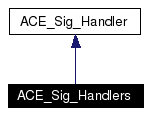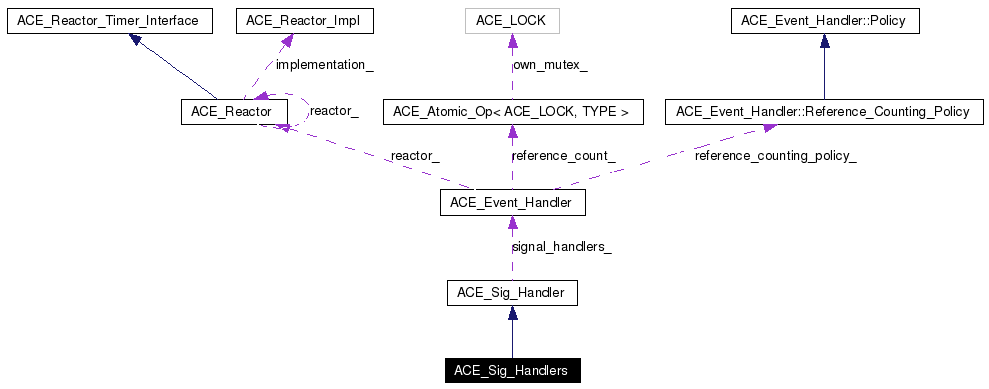
#include <Sig_Handler.h>
Inheritance diagram for ACE_Sig_Handlers:


Public Member Functions | |
| virtual int | register_handler (int signum, ACE_Event_Handler *new_sh, ACE_Sig_Action *new_disp=0, ACE_Event_Handler **old_sh=0, ACE_Sig_Action *old_disp=0) |
| virtual int | remove_handler (int signum, ACE_Sig_Action *new_disp=0, ACE_Sig_Action *old_disp=0, int sigkey=-1) |
| virtual ACE_Event_Handler * | handler (int signum) |
| virtual ACE_Event_Handler * | handler (int signum, ACE_Event_Handler *) |
| void | dump (void) const |
| Dump the state of an object. | |
Static Public Member Functions | |
| void | dispatch (int signum, siginfo_t *, ucontext_t *) |
Public Attributes | |
| ACE_ALLOC_HOOK_DECLARE | |
| Declare the dynamic allocation hooks. | |
Static Private Attributes | |
| int | sigkey_ = 0 |
| int | third_party_sig_handler_ = 0 |
Using this class a program can register one or more ACE_Event_Handler with the ACE_Sig_Handler in order to handle a designated signum. When a signal occurs that corresponds to this signum, the methods of all the registered ACE_Event_Handlers are invoked automatically.
Definition at line 160 of file Sig_Handler.h.
|
||||||||||||||||
|
Callback routine registered with sigaction(2) that dispatches the method of all the pre-registered ACE_Event_Handlers for signum Reimplemented from ACE_Sig_Handler. Definition at line 530 of file Sig_Handler.cpp. References ACE_ASSERT, ACE_SIG_HANDLERS_ITERATOR, ACE_SIG_HANDLERS_SET, ACE_TRACE, ACE_Fixed_Set_Iterator_Base< T, ACE_SIZE >::advance(), ACE_Sig_Handlers_Set::instance(), ACE_Fixed_Set_Iterator< T, ACE_SIZE >::next(), ACE_Fixed_Set< T, ACE_SIZE >::remove(), and ucontext_t.
00533 {
00534 ACE_TRACE ("ACE_Sig_Handlers::dispatch");
00535 // The following is #ifdef'd out because it's entirely non-portable
00536 // to acquire a mutex in a signal handler...
00537 #if 0
00538 ACE_MT (ACE_Recursive_Thread_Mutex *lock =
00539 ACE_Managed_Object<ACE_Recursive_Thread_Mutex>::get_preallocated_object
00540 (ACE_Object_Manager::ACE_SIG_HANDLER_LOCK);
00541 ACE_TSS_Guard<ACE_Recursive_Thread_Mutex> m (*lock));
00542 #endif /* 0 */
00543
00544 // Save/restore errno.
00545 ACE_Errno_Guard error (errno);
00546
00547 ACE_Sig_Handler::sig_pending_ = 1;
00548
00549 // Darn well better be in range since the OS dispatched this...
00550 ACE_ASSERT (ACE_Sig_Handler::in_range (signum));
00551
00552 ACE_SIG_HANDLERS_SET *handler_set =
00553 ACE_Sig_Handlers_Set::instance (signum);
00554
00555 ACE_SIG_HANDLERS_ITERATOR handler_iterator (*handler_set);
00556
00557 for (ACE_Event_Handler **eh = 0;
00558 handler_iterator.next (eh) != 0;
00559 handler_iterator.advance ())
00560 {
00561 if ((*eh)->handle_signal (signum, siginfo, ucontext) == -1)
00562 {
00563 handler_set->remove (*eh);
00564 delete *eh;
00565 }
00566 }
00567 }
|
|
|
Dump the state of an object.
Reimplemented from ACE_Sig_Handler. Definition at line 333 of file Sig_Handler.cpp. References ACE_TRACE.
00334 {
00335 #if defined (ACE_HAS_DUMP)
00336 ACE_TRACE ("ACE_Sig_Handlers::dump");
00337 #endif /* ACE_HAS_DUMP */
00338 }
|
|
||||||||||||
|
Set a new ACE_Event_Handler that is associated with SIGNUM at the head of the list of signals. Return the existing handler that was at the head. Reimplemented from ACE_Sig_Handler. Definition at line 592 of file Sig_Handler.cpp. References ACE_NEW_RETURN, ACE_SIG_HANDLERS_ITERATOR, ACE_SIG_HANDLERS_SET, ACE_TRACE, ACE_Fixed_Set< T, ACE_SIZE >::insert(), ACE_Sig_Handlers_Set::instance(), ACE_Fixed_Set_Iterator< T, ACE_SIZE >::next(), ACE_Fixed_Set< T, ACE_SIZE >::remove(), and sigkey_.
00593 {
00594 ACE_TRACE ("ACE_Sig_Handlers::handler");
00595 ACE_SIG_HANDLERS_SET *handler_set =
00596 ACE_Sig_Handlers_Set::instance (signum);
00597 ACE_SIG_HANDLERS_ITERATOR handler_iterator (*handler_set);
00598 ACE_Event_Handler **eh = 0;
00599
00600 // Find the first handler...
00601 handler_iterator.next (eh);
00602
00603 // ... then remove it from the set ...
00604 handler_set->remove (*eh);
00605
00606 // ... and then insert the new signal handler into the beginning of
00607 // the set (note, this is a bit too tied up in the implementation of
00608 // ACE_Unbounded_Set...).
00609 ACE_Sig_Adapter *temp;
00610
00611 ACE_NEW_RETURN (temp,
00612 ACE_Sig_Adapter (new_sh,
00613 ++ACE_Sig_Handlers::sigkey_),
00614 0);
00615 handler_set->insert (temp);
00616 return *eh;
00617 }
|
|
|
Return the head of the list of s associated with SIGNUM. Reimplemented from ACE_Sig_Handler. Definition at line 574 of file Sig_Handler.cpp. References ACE_SIG_HANDLERS_ITERATOR, ACE_SIG_HANDLERS_SET, ACE_TRACE, ACE_Sig_Handlers_Set::instance(), and ACE_Fixed_Set_Iterator< T, ACE_SIZE >::next().
00575 {
00576 ACE_TRACE ("ACE_Sig_Handlers::handler");
00577 ACE_SIG_HANDLERS_SET *handler_set =
00578 ACE_Sig_Handlers_Set::instance (signum);
00579 ACE_SIG_HANDLERS_ITERATOR handler_iterator (*handler_set);
00580 ACE_Event_Handler **eh = 0;
00581 handler_iterator.next (eh);
00582 return *eh;
00583 }
|
|
||||||||||||||||||||||||
|
Add a new ACE_Event_Handler and a new sigaction associated with signum. Passes back the existing ACE_Event_Handler and its sigaction if pointers are non-zero. Returns -1 on failure and a that is >= 0 on success. Reimplemented from ACE_Sig_Handler. Definition at line 344 of file Sig_Handler.cpp. References ACE_BIT_DISABLED, ACE_NEW_RETURN, ace_signal_handlers_dispatcher, ACE_SignalHandler, ACE_TRACE, ACE_Sig_Action::flags(), ACE_Sig_Action::handler(), ACE_Sig_Handler::in_range(), ACE_Fixed_Set< T, ACE_SIZE >::insert(), ACE_Sig_Handlers_Set::instance(), ACE_Sig_Action::register_action(), ACE_Fixed_Set< T, ACE_SIZE >::remove(), ACE_Sig_Action::retrieve_action(), SA_RESTART, SA_SIGINFO, SIG_DFL, SIG_IGN, ACE_Sig_Adapter::sigkey(), sigkey_, and third_party_sig_handler_.
00349 {
00350 ACE_TRACE ("ACE_Sig_Handlers::register_handler");
00351 ACE_MT (ACE_Recursive_Thread_Mutex *lock =
00352 ACE_Managed_Object<ACE_Recursive_Thread_Mutex>::get_preallocated_object
00353 (ACE_Object_Manager::ACE_SIG_HANDLER_LOCK);
00354 ACE_Guard<ACE_Recursive_Thread_Mutex> m (*lock));
00355
00356 if (ACE_Sig_Handler::in_range (signum))
00357 {
00358 ACE_Sig_Adapter *ace_sig_adapter = 0; // Our signal handler.
00359 ACE_Sig_Adapter *extern_sh = 0; // An external signal handler.
00360 ACE_Sig_Action sa;
00361
00362 // Get current signal disposition.
00363 sa.retrieve_action (signum);
00364
00365 // Check whether we are already in control of the signal
00366 // handling disposition...
00367
00368 if (!(sa.handler () == ace_signal_handlers_dispatcher
00369 || sa.handler () == ACE_SignalHandler (SIG_IGN)
00370 || sa.handler () == ACE_SignalHandler (SIG_DFL)))
00371 {
00372 // Drat, a 3rd party library has already installed a signal ;-(
00373
00374 // Upto here we never disabled RESTART_MODE. Thus,
00375 // RESTART_MODE can only be changed by 3rd party libraries.
00376
00377 if (ACE_BIT_DISABLED (sa.flags (), SA_RESTART)
00378 && ACE_Sig_Handlers::third_party_sig_handler_)
00379 // Toggling is disallowed since we might break 3rd party
00380 // code.
00381 return -1;
00382
00383 // Note that we've seen a 3rd party handler...
00384 ACE_Sig_Handlers::third_party_sig_handler_ = 1;
00385
00386 // Create a new 3rd party disposition, remembering its
00387 // preferred signal blocking etc...;
00388 ACE_NEW_RETURN (extern_sh,
00389 ACE_Sig_Adapter (sa,
00390 ++ACE_Sig_Handlers::sigkey_),
00391 -1);
00392 // Add the external signal handler to the set of handlers
00393 // for this signal.
00394 if (ACE_Sig_Handlers_Set::instance (signum)->insert (extern_sh) == -1)
00395 {
00396 delete extern_sh;
00397 return -1;
00398 }
00399 }
00400 // Add our new handler at this point.
00401 ACE_NEW_RETURN (ace_sig_adapter,
00402 ACE_Sig_Adapter (new_sh,
00403 ++ACE_Sig_Handlers::sigkey_),
00404 -1);
00405 // Add the ACE signal handler to the set of handlers for this
00406 // signal (make sure it goes before the external one if there is
00407 // one of these).
00408 if (ACE_Sig_Handlers_Set::instance (signum)->insert (ace_sig_adapter) == -1)
00409 {
00410 // We couldn't reinstall our handler, so let's pretend like
00411 // none of this happened...
00412 if (extern_sh)
00413 {
00414 ACE_Sig_Handlers_Set::instance (signum)->remove (extern_sh);
00415 delete extern_sh;
00416 }
00417 delete ace_sig_adapter;
00418 return -1;
00419 }
00420 // If ACE_Sig_Handlers::dispatch() was set we're done.
00421 else if (sa.handler () == ace_signal_handlers_dispatcher)
00422 return ace_sig_adapter->sigkey ();
00423
00424 // Otherwise, we need to register our handler function so that
00425 // all signals will be dispatched through ACE.
00426 else
00427 {
00428 // Make sure that new_disp points to a valid location if the
00429 // user doesn't care...
00430 if (new_disp == 0)
00431 new_disp = &sa;
00432
00433 new_disp->handler (ace_signal_handlers_dispatcher);
00434
00435 // Default is to restart signal handlers.
00436 new_disp->flags (new_disp->flags () | SA_RESTART);
00437 new_disp->flags (new_disp->flags () | SA_SIGINFO);
00438
00439 // Finally install (possibly reinstall) the ACE signal
00440 // handler disposition with the SA_RESTART mode enabled.
00441 if (new_disp->register_action (signum, old_disp) == -1)
00442 {
00443 // Yikes, lots of roll back at this point...
00444 ACE_Sig_Handlers_Set::instance (signum)->remove (ace_sig_adapter);
00445 delete ace_sig_adapter;
00446
00447 if (extern_sh)
00448 {
00449 ACE_Sig_Handlers_Set::instance (signum)->remove (extern_sh);
00450 delete extern_sh;
00451 }
00452 return -1;
00453 }
00454 else // Return the signal key so that programs can cancel this
00455 // handler if they want!
00456 return ace_sig_adapter->sigkey ();
00457 }
00458 }
00459
00460 return -1;
00461 }
|
|
||||||||||||||||||||
|
Remove an ACE_Event_Handler currently associated with signum. We remove the handler if (1) its matches the passed as a parameter or (2) if we've been told to remove all the handlers, i.e., == -1. If a new disposition is given it is installed and the previous disposition is returned (if desired by the caller). Returns 0 on success and -1 if signum is invalid. Reimplemented from ACE_Sig_Handler. Definition at line 469 of file Sig_Handler.cpp. References ACE_SIG_HANDLERS_ITERATOR, ACE_SIG_HANDLERS_SET, ACE_TRACE, ACE_Fixed_Set_Iterator_Base< T, ACE_SIZE >::advance(), ACE_Sig_Handler::in_range(), ACE_Sig_Handlers_Set::instance(), ACE_Fixed_Set_Iterator< T, ACE_SIZE >::next(), ACE_Sig_Action::register_action(), ACE_Fixed_Set< T, ACE_SIZE >::remove(), SIG_DFL, ACE_Sig_Adapter::sigkey(), and ACE_Fixed_Set< T, ACE_SIZE >::size().
00473 {
00474 ACE_TRACE ("ACE_Sig_Handlers::remove_handler");
00475 ACE_MT (ACE_Recursive_Thread_Mutex *lock =
00476 ACE_Managed_Object<ACE_Recursive_Thread_Mutex>::get_preallocated_object
00477 (ACE_Object_Manager::ACE_SIG_HANDLER_LOCK);
00478 ACE_Guard<ACE_Recursive_Thread_Mutex> m (*lock));
00479
00480 if (ACE_Sig_Handler::in_range (signum))
00481 {
00482 ACE_SIG_HANDLERS_SET *handler_set =
00483 ACE_Sig_Handlers_Set::instance (signum);
00484
00485 ACE_SIG_HANDLERS_ITERATOR handler_iterator (*handler_set);
00486
00487 // Iterate through the set of handlers for this signal.
00488
00489 for (ACE_Event_Handler **eh;
00490 handler_iterator.next (eh) != 0;
00491 handler_iterator.advance ())
00492 {
00493 // Type-safe downcast would be nice here...
00494 ACE_Sig_Adapter *sh = (ACE_Sig_Adapter *) *eh;
00495
00496 // Remove the handler if (1) its key matches the key we've
00497 // been told to remove or (2) if we've been told to remove
00498 // *all* handlers (i.e., <sigkey> == -1).
00499
00500 if (sh->sigkey () == sigkey || sigkey == -1)
00501 {
00502 handler_set->remove (*eh);
00503 delete *eh;
00504 }
00505 }
00506
00507 if (handler_set->size () == 0)
00508 {
00509 // If there are no more handlers left for a signal then
00510 // register the new disposition or restore the default
00511 // disposition.
00512
00513 ACE_Sig_Action sa (SIG_DFL, (sigset_t *) 0);
00514
00515 if (new_disp == 0)
00516 new_disp = &sa;
00517
00518 return new_disp->register_action (signum, old_disp);
00519 }
00520 return 0;
00521 }
00522 else
00523 return -1;
00524 }
|
|
|
Declare the dynamic allocation hooks.
Reimplemented from ACE_Sig_Handler. Definition at line 215 of file Sig_Handler.h. |
|
|
Keeps track of the id that uniquely identifies each registered signal handler. This id can be used to cancel a timer via the method. Definition at line 295 of file Sig_Handler.cpp. Referenced by handler(), and register_handler(). |
|
|
If this is > 0 then a 3rd party library has registered a handler... Definition at line 299 of file Sig_Handler.cpp. Referenced by register_handler(). |
 1.3.6
1.3.6